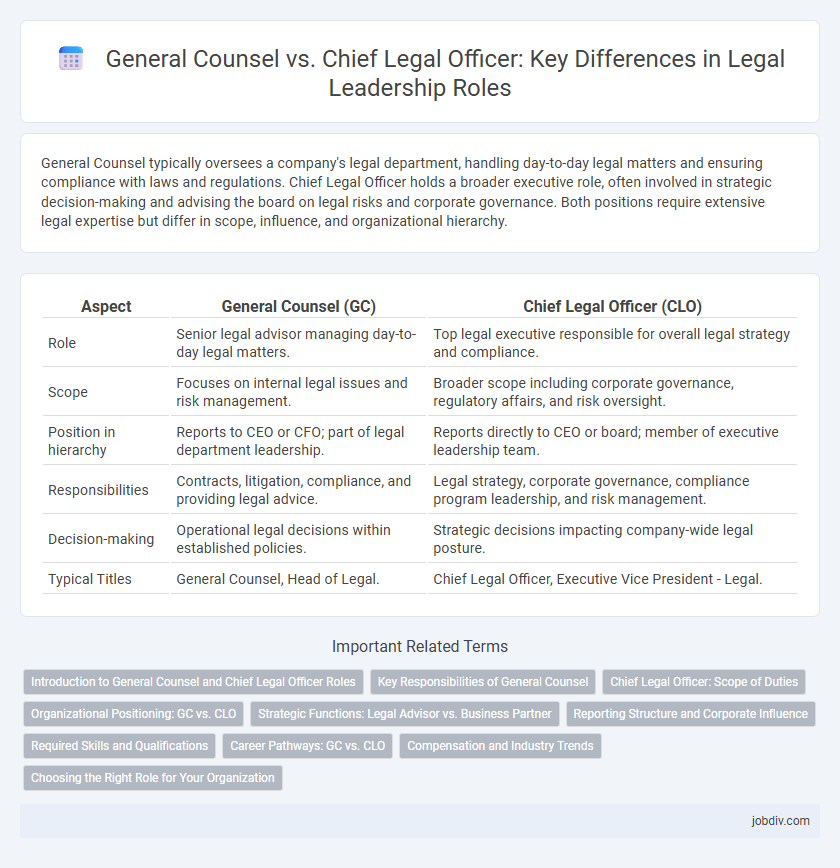General Counsel typically oversees a company's legal department, handling day-to-day legal matters and ensuring compliance with laws and regulations. Chief Legal Officer holds a broader executive role, often involved in strategic decision-making and advising the board on legal risks and corporate governance. Both positions require extensive legal expertise but differ in scope, influence, and organizational hierarchy.
Table of Comparison
| Aspect | General Counsel (GC) | Chief Legal Officer (CLO) |
|---|---|---|
| Role | Senior legal advisor managing day-to-day legal matters. | Top legal executive responsible for overall legal strategy and compliance. |
| Scope | Focuses on internal legal issues and risk management. | Broader scope including corporate governance, regulatory affairs, and risk oversight. |
| Position in hierarchy | Reports to CEO or CFO; part of legal department leadership. | Reports directly to CEO or board; member of executive leadership team. |
| Responsibilities | Contracts, litigation, compliance, and providing legal advice. | Legal strategy, corporate governance, compliance program leadership, and risk management. |
| Decision-making | Operational legal decisions within established policies. | Strategic decisions impacting company-wide legal posture. |
| Typical Titles | General Counsel, Head of Legal. | Chief Legal Officer, Executive Vice President - Legal. |
Introduction to General Counsel and Chief Legal Officer Roles
The General Counsel (GC) serves as the primary legal advisor responsible for overseeing a company's legal compliance, managing litigation, and guiding corporate governance. The Chief Legal Officer (CLO) holds a broader executive role, integrating legal strategy with business objectives and often participating in C-suite decision-making. Both roles require expertise in risk management, regulatory affairs, and contract negotiation, but the CLO typically assumes a more strategic, company-wide leadership position.
Key Responsibilities of General Counsel
The General Counsel primarily oversees the legal affairs of an organization, providing advice on compliance, risk management, and litigation strategies. They manage internal legal teams, coordinate with external counsel, and ensure adherence to regulatory requirements. Additionally, the General Counsel plays a vital role in contract negotiation, corporate governance, and protecting intellectual property rights.
Chief Legal Officer: Scope of Duties
The Chief Legal Officer (CLO) oversees the entire legal function within an organization, integrating legal strategy with business objectives to mitigate risks and ensure compliance. Responsibilities include managing corporate governance, overseeing regulatory affairs, directing litigation strategy, and advising the executive team on legal implications of business decisions. The CLO often serves as a key member of the senior leadership team, driving legal innovation and alignment with overall corporate goals.
Organizational Positioning: GC vs. CLO
The General Counsel (GC) typically serves as the primary legal advisor within the legal department, focusing on managing legal risks and providing counsel on regulatory compliance. In contrast, the Chief Legal Officer (CLO) holds a more strategic executive role, often positioned at the C-suite level with broader responsibilities that include overseeing corporate governance, risk management, and aligning legal strategy with overall business objectives. While both roles require legal expertise, the CLO usually has greater influence on organizational decision-making and cross-functional leadership beyond the legal function.
Strategic Functions: Legal Advisor vs. Business Partner
The General Counsel primarily serves as the chief legal advisor, focusing on risk management, compliance, and legal oversight within corporate governance. In contrast, the Chief Legal Officer (CLO) operates as a strategic business partner, integrating legal insights with corporate strategy to drive business growth and innovation. CLOs engage proactively in decision-making processes, aligning legal frameworks with organizational objectives to enhance competitive advantage.
Reporting Structure and Corporate Influence
General Counsel typically reports directly to the CEO or the Board, serving as the primary legal advisor responsible for managing legal risks and compliance. Chief Legal Officers often hold a broader strategic role with elevated corporate influence, sometimes participating in executive leadership teams and reporting to the CEO or COO. The CLO's position enables greater integration of legal strategy into overall business decisions, reflecting higher organizational authority compared to the General Counsel.
Required Skills and Qualifications
General Counsel typically requires extensive experience in corporate law, strong leadership abilities, and expertise in regulatory compliance to manage a company's legal risks. Chief Legal Officer demands advanced strategic thinking, exceptional negotiation skills, and the ability to align legal strategies with overall business objectives. Both roles necessitate a law degree, bar admission, and a track record of advising executive leadership.
Career Pathways: GC vs. CLO
General Counsel (GC) often progresses through corporate legal departments, gaining expertise in regulatory compliance, contract negotiation, and litigation management, typically acting as the primary legal advisor within an organization. Chief Legal Officers (CLO) usually advance from the GC role or senior legal leadership positions, expanding their scope to oversee entire legal strategies, risk management, and corporate governance at the executive management level. Career pathways to CLO demand a blend of advanced legal knowledge, strategic business acumen, and executive leadership experience beyond the traditional GC responsibilities.
Compensation and Industry Trends
General Counsel typically receive base salaries ranging from $150,000 to $400,000, with bonuses and equity incentives reflecting company size and industry, while Chief Legal Officers command higher total compensation packages often exceeding $500,000 due to broader strategic responsibilities. Industry trends show increasing demand for CLs with cross-functional expertise, driving competitive pay especially in tech, finance, and healthcare sectors. Equity participation and performance-based bonuses are becoming standard for Chief Legal Officers, highlighting their role in corporate governance and risk management.
Choosing the Right Role for Your Organization
Selecting the right role between General Counsel and Chief Legal Officer depends on your organization's size, complexity, and strategic needs. General Counsel typically focuses on managing legal risks, compliance, and providing legal advice, while Chief Legal Officers oversee broader legal strategies aligned with business goals and often participate in executive decision-making. Evaluating your company's governance structure and growth plans ensures the chosen role supports effective legal oversight and drives organizational success.
General Counsel vs Chief Legal Officer Infographic

 jobdiv.com
jobdiv.com